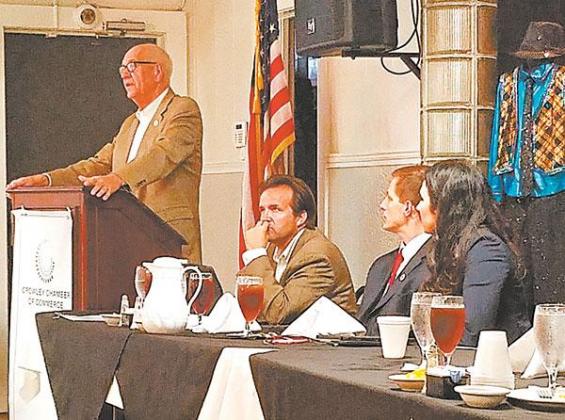
Howell Dennis/Crowley Post-Signal
After the three state legislators in attendance of this week’s Legislative Breakfast – Reps. John Stefanski, R-Crowley; and Phillip DeVillier, R-Eunice; as well as Sen. Dan “Blade” Morrish, R-Jennings – each delivered a speech, they took a few questions from those in attendance.
Political strategist Blake Corely began by complimenting Morrish on his service and stating how impressed with Morrish’s boldness he was on certain votes to cross party lines.
“I appreciate that, Blake,” replied Morrish. “But every one up here and anyone in the audience who ran for office could be considered as being ‘bold’ for simply running for office and being willing to represent their district.
“It isn’t an easy job.”
“I’m willing to vote with whoever does what’s best for District 41,” replied DeVillier. “I don’t represent a party, I represent District 41.”
Paul Molbert asked about the possibility of the legislature having a Constitutional Convention
“I’m 100 percent behind that,” replied Stefanski. “But I never realized just how hard a six month session could be. A year to a year-and-a-half to have a convention would lead to a lot of pushback. This is a part-time job. Keeping people away from their wives and families would be tough.”
“I’ve been in the legislature 21 years and we’ve had 21 bills for a convention,” said Morrish. “They’ve never passed.”
“There are plenty of people alive today that were in the legislature when they had the last convention in 1973,” replied DeVillier. “Talk to them about what we got right and wrong. It’s going to take a governor, a strong leader, in charge to get that done.”
Danny Nugier inquired about the TOPS program and a bill that was introduced to use gambling money to fund education.
“Where is that going at this time?,” he asked,
“The lottery money was supposed to go to education, not specifically to TOPS,” replied Morrish. “The rest of that money goes into the state general fund. I never in my life dreamed that the amount of revenue generated by oil and gas would ever equal that generated by gambling. They were both at 8 percent last year.”
Then Morrish added a tidbit that somewhat stunned the room.
“I have a personal opinion that the state cannot afford TOPS,” he said. “When we first began with it, it cost $35 million. Now it’s over $350 million. We need to look at states like Tennessee and Georgia.
“Now, I realize that’s spoken like a termed-out legislator and it’s not a popular idea. But why do some states use the program for students that have a GPA of 3.25 and we only require a 2.5? We have other issues like infrastructure and only 24 percent of our students use it.”
“I agree with Dan,” said DeVillier. “I was told the numbers were different (from $50 million to $250 million), but what concerns me are the students who take advantage of it and then drop out of school their freshman year.
“I think the way you perform your first year should dictate whether you receive it in your second, and the same should go from second to third and third to fourth.”
Stefanski mentioned how he had friends that began college and eventually dropped out and worked blue collar jobs such as welding.
“We have to make tweaks,” he said. “Louisiana has a long history of being short on work force training. We need to fill the lost jobs in the state. I’d like to look into it when I get there but I think long term tweaks should be added to it.”
Following the questions Crowley Chamber of Commerce President and CEO Amy Thibodeaux thanked those in attendance as well as the speakers for their attendance.
